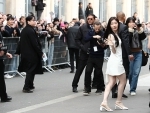
Perceptions of a ‘normal’ body image distorted by media and current trends in beauty practices
As a result, they state that it is becoming normal to carry out more beauty practices, making it ever-harder to meet acceptable standards of appearance.
Members of the Beauty Demands network made a series of recommendations in a policy briefing, The Changing Requirements of Beauty, launched at the Nuffield Council on Bioethics in London today. The recommendations address the issues around beauty norms and body image.
Professor Heather Widdows, lead researcher from the University of Birmingham said: ‘We are all expected to do more to keep up with beauty routines, the rising bar of what is “normal” keeps changing and levels of what is perceived to be minimum beauty standards are becoming harder to attain. For example, manicures and nail polish were once just a luxury, now for many women they are part of a weekly routine.’
The network suggested that this is in part because of an increasingly visual culture, meaning the proliferation of social media images and the sharing of ‘selfies’, which are often digitally manipulated, has distorted the ideals of a ‘normal’ body image. The network also found that vulnerability affected our decisions around beauty practices.
Professor Widdows said: ‘By purchasing beauty products we are required to recognise that there are things wrong with our bodies or things we could improve upon. This is down to many of us not feeling “good enough”, which makes us want to change things about our bodies.’
As a result of the changing parameters of acceptable beauty practices, what were once considered ‘extreme’ practices were found to be more commonplace.
Professor Widdows added: ‘Beauty practices that were once extreme are gradually becoming routine. For example, using hair dye and removing body hair was once regarded as exceptional, now virtually all women under a certain age dye their hair and almost all remove visible body hair with some women very likely to remove all pubic hair.
‘As practices like Botox and breast implants become normalised, rather than just for the rich and famous, it may be that these practices also become regarded as routine and required for all.’
The researchers also found that pressure to conform to differing standards of beauty meant that an understanding of what is ‘normal’ was hugely distorted and underpinned by value judgements.
The network suggested that the concept of ‘normal’ was not only influenced by social media images, magazines and films, but by personal experience of those around us in our daily lives, such as family and friends.
The Beauty Demands Network produced a number of recommendations, including:
· To recognise that ‘normal’ is a value judgment and not a neutral or descriptive term;
· To improve understandings and representations of ‘normal bodies’;
· To recognise that consent might be compromised by pressures to conform;
· To recognise the potential for vulnerability in the beauty context.
Image: Wikimedia Commons
Support Our Journalism
We cannot do without you.. your contribution supports unbiased journalism
IBNS is not driven by any ism- not wokeism, not racism, not skewed secularism, not hyper right-wing or left liberal ideals, nor by any hardline religious beliefs or hyper nationalism. We want to serve you good old objective news, as they are. We do not judge or preach. We let people decide for themselves. We only try to present factual and well-sourced news.







